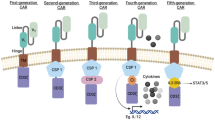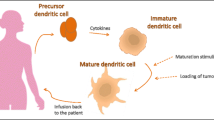Abstract
The T lymphocyte has a vital part to play in maintaining the host response to bacterial and viral infection and also appears to play a key pathological role in autoimmune diseases such as rheumatoid arthritis. In this review, we summarize the signalling pathways which trigger antigen-driven T-cell proliferation and examine the evidence which suggests that protein kinase C (PKC) is fundamental to this process. Finally, we discuss the therapeutic potential that PKC inhibitors may have in the treatment of autoimmune disease.
Similar content being viewed by others
Author information
Authors and Affiliations
Additional information
Received 31 March 1998; received after revision 19 May 1998; accepted 19 May 1998
Rights and permissions
About this article
Cite this article
Wilkinson, S., Nixon, J. T-cell signal transduction and the role of protein kinase C. CMLS, Cell. Mol. Life Sci. 54, 1122–1144 (1998). https://doi.org/10.1007/s000180050241
Published:
Issue Date:
DOI: https://doi.org/10.1007/s000180050241




